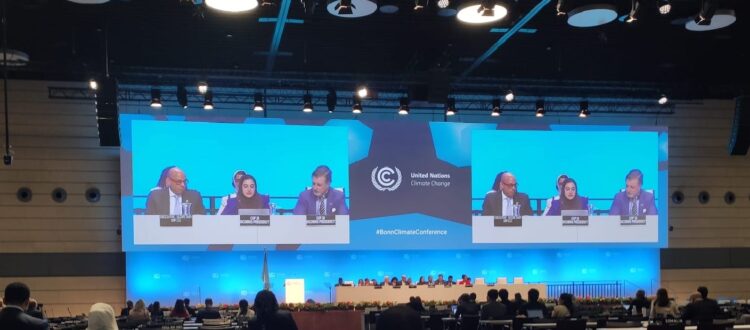PRESIDENCY GOALS PRESENTED
With the opening of the second week of interim negotiations in Bonn, the COP28 presidency presented the main objectives of the upcoming COP28, which this year will be hosted by Dubai, in the United Arab Emirates.
The presidency stated that it is committed, together with the UAE government, to ensuring a transparent and ‘underpinned by optimism’ process, based on optimism about the results to be achieved. But what are these goals? We have been saying for months that COP28 appears perhaps even more obscure at the outset, concerning priorities and goals than even COP27 which we all left with too many question marks.
To satisfy all parties involved, a phrase often repeated by the new presidency, an agenda was presented today that was perhaps too broad, so much so that it provoked criticism from some states, including Brazil and Argentina.
The first topic mentioned, again this week, was Global Stocktake, and the need to work together to get ambitious new national climate targets (NDCs) from states – an upward revision decided in Glasgow towards COP27, aborted in Sharm el-Sheikh because of the war in Ukraine and now back on the table.
Mitigation is at the heart of the agenda, the presidency assured, with emission reduction targets based on science and in line to keep the global average temperature increase within 1.5°C of the pre-industrial era. While the explicit references to the IPCC’s limit thresholds are a good sign, the topic of new quantitative emission targets is simultaneously at the heart of the agenda discussions here in Bonn and may not arrive entirely solid or well-prepared at COP28 – it is necessary here to understand what the Emiratis mean.
While the COP28 presidency explicitly mentioned quantitative targets related to the reduction of carbon dioxide emissions, as well as methane emissions, it was emphasised that ‘energy security must remain at the core’ of the action and that this must take place ‘in close cooperation with high emitting sectors.
Adaptation was also mentioned as one of the key issues, along with reaching an agreement on a comprehensive set of loss and damage indicators (a taxonomy, absent to date but necessary to launch the new global fund at COP28). The same for the goal of making adequate climate finance instruments operational.
There is no lack of a jab at the countries of the global North on the long-standing issue of climate finance: “This year must mark the completion of the commitment to provide the 100 billion” annually to developing countries based on what, in 2009, the developed countries had promised to do by 2020 – a promise never kept dating. More than an agenda item, it is an invitation to fulfil promises.
Private investments will also have to be scaled up to the right scale to support mitigation and adaptation actions, and the presidency in this sense has declared that it will continue ‘to create a reform of the global financial system in this direction’, just a few days before the start of the Paris forum on the new global financial pact on 22 and 23 June, which Macron and Mottley had already called for at COP27.
In addition to what was indicated as an integral part of the COP28 strategy, also relevant is the emphasis on the centrality of the phase-out not only of fossil fuels without (‘unabated’) CCS technologies, but also of subsidies to them by the EU. The importance of phase-out was also emphasised by the organisations and associations present, in line with what has been seen and discussed – but then never approved in the halls – since Glasgow.
The plenary closed with a call for a strong result during these negotiations in Bonn, to provide a solid basis for the Dubai conference. Almost a wish, given the chaos of these first days in Germany.
Article by Elisa Terenghi, Italian Climate Network volunteer

